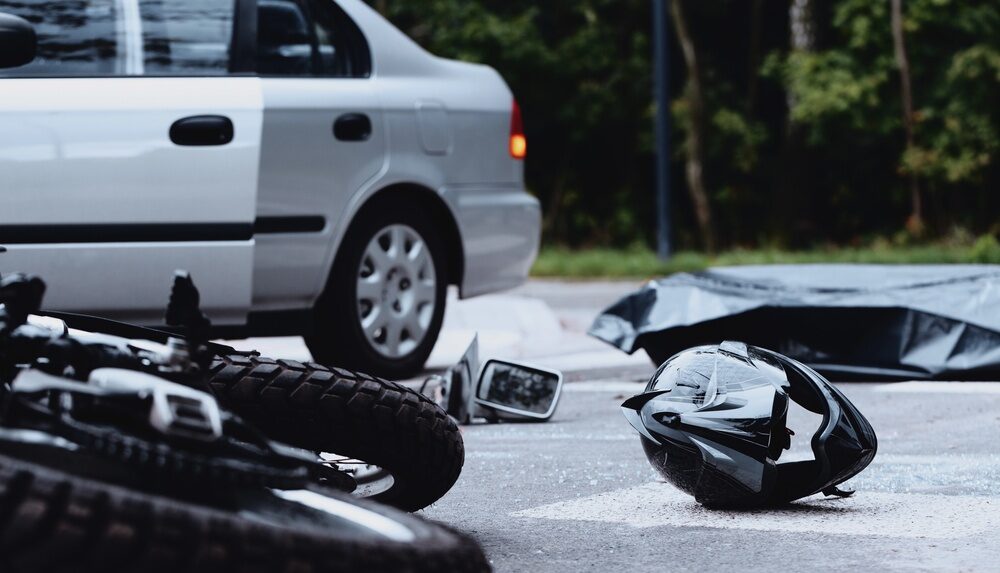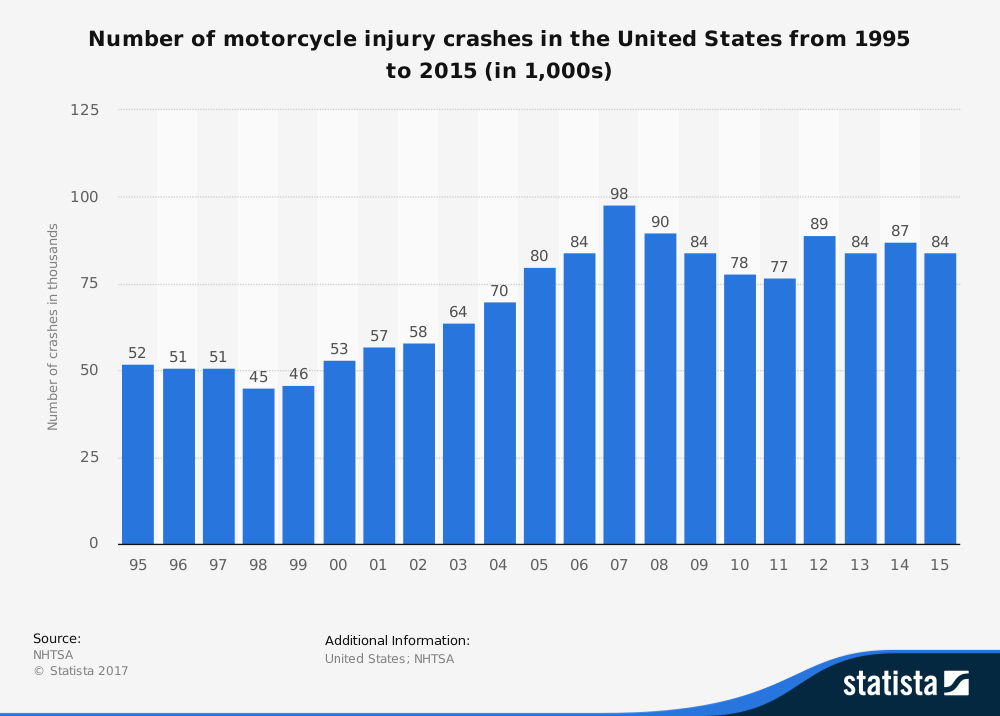
What To Expect After a Providence Motorcycle Accident
Motorcycle accidents in Rhode Island occur daily and are more prevalent in the summer months. Motorcyclists are some of the most vulnerable motorists on Rhode Island’s roads. Riders are around 28 times more likely to die in a traffic crash than other motorists. Without airbags or seatbelts to protect them, they may also face a higher risk of serious injuries, like road rash, brain injuries, broken bones, and more.
If you’re struggling to recover after a motorcycle accident injury, you have options to get the compensation you need. Below, discover facts and figures about motorcycle accidents, including motorcycle accident statistics, common motorcycle accident injuries, and how a personal injury lawyer can help you recover.
Motorcycle accident statistics
Nationally, motorcyclists made up 14.6% of all fatal traffic fatalities and 3.5% of all traffic injuries in 2022. Moreover, the number of non-fatal injuries increased by 2.6% between 2021 and 2022. When pedestrians are involved those numbers increase substantially
What’s more, around 40 percent of motorcycle fatalities occur when motorcyclists don’t wear helmets. Yet Rhode Island doesn’t have a helmet law. For that reason, it’s always best to wear a helmet, even if it’s technically legal to go without.
Additionally, most fatal motorcycle accidents occur:
- In urban environments
- During good weather during the daytime
- In accidents involving two or more vehicles
Types of motorcycle accident injuries
The accident type can influence your potential motorcycle crash injuries. So can factors like the motorcycle’s size and your motorcycle safety gear choices.
Some of the most common motorcycle accident injuries include the following.
- Brain injuries. Motorcyclists may face a risk of serious head injuries, such as concussions, traumatic brain injuries (TBIS), and more. Head injuries are more common among cyclists who don’t wear helmets and with those who ride cycles with larger engines (1,000+ cc.)
- Trunk injuries. The chest is vulnerable during crashes, which can cause trunk injuries such as rib fractures, punctured or collapsed lungs, heart contusions, or internal bleeding. Older cyclists are more vulnerable to these types of injuries, as well as those who ride larger-engined motorcycles.
- Abdominal Injuries. Blunt trauma to the stomach area can cause internal injuries to the organs or cause dangerous internal bleeding. The spleen and liver are the most commonly affected organs in motorcycle incidents. Abdominal injuries don’t seem to depend on a motorcycle’s size or on the cyclist’s age.
- Spinal injuries, drivers may face spinal injuries, like broken vertebrae, bulging or herniated discs, or even paralysis. Younger riders face a higher risk of spinal injuries than those over 40.
- Arm injuries. Motorcyclists often instinctively try to break their fall with their arms. This can lead to fractures, bruises, sprains, and other injuries.
- Road rash. Exposed skin is vulnerable to friction burns, more commonly known as “road rash.” The damaged skin can be vulnerable to complications like infections without proper care.
What to do after motorcycle accidents
After a motorcycle crash, it’s crucial to follow the right procedure to make the claims process easier. Remember the following steps immediately after the accident and during your early recovery period.
-
- Stay where you are. If you’re injured, try not to get up or move until first responders arrive. Moving from your original position could potentially exacerbate neck or spinal injuries. Unless you’re in immediate danger or in the flow of traffic, try to stay where you are.
- Dial 911. Always call and report the accident, even if you can get up and walk away. Your body’s fight or flight response may mask more extensive injuries. So, you’ll want the accident on record when you’re ready to make an insurance claim.
- Leave the scene untouched. If you can, don’t move your motorcycle until the police arrive. You want to paint an accurate picture of the scene, and moving your motorcycle could make details unclear in the accident report or your case photos.
- Talk to witnesses. If witnesses are nearby, ask the responding police officers to talk to them and include their information in the record. Often, the police won’t take down this information unless you insist. You can also talk to the witnesses yourself – just make sure to get their names and contact info, in case you need them to make a statement later.
- Document the scene. In addition to, the police documenting the scene, take your own photo and video evidence of the crash site. Take photos of your motorcycle, other vehicles, the general scene, and any potential injuries you might have.
- Stay off social media. While you may be tempted to share your photos and videos with your closest friends and family, it’s best to stay off social media in the immediate aftermath. If you misspeak or misrepresent the accident, the insurance company can use your written statement against you. Instead, stay off social media and don’t discuss your case publicly until you have a settlement.
- Keep records of everything. In the days and weeks after the accident, your recovery is the top priority. Remember to keep track of all your important documents, such as medical bills and records. If you can’t do this yourself, ask a trusted family member or friend to keep them for you.
- Call your lawyer. While many people believe you must call your insurance company at the accident scene, this isn’t the case. In fact, you can wait until after you’ve consulted with a Providence personal injury lawyer to gain a better understanding of your rights.
What types of damages can I recover after motorcycle accidents?
If you’re involved in a motorcycle accident where you’re not at fault, you’ll likely be able to file a claim with the at-fault person’s insurance company. Some of the damages you can recover include the following.
- Property damage claims. This could cover the cost of repairing or replacing your motorcycle, or any other damaged belongings.
- Lost wages. If you spent time off work recovering in the hospital or going to doctor’s appointments, you may be able to reclaim lost wages for your time off work.
- Bodily injury claims. This includes the bills from your physical injuries and any ongoing treatment or physical therapy you may need.
- Pain and suffering. This can include the emotional toll of the accident, such as if you develop PTSD or driving anxiety.
Insurance companies may be reluctant to pay the full extent of their policies since it impacts their bottom line. For that reason, it’s a good idea to have a dedicated motorcycle accident lawyer on your side to negotiate for you.
A Rhode Island motorcycle accident lawyer on your side
If you need help maximizing your claim after a motorcycle accident, Petrarca Law is here for you.
We’ll be with you every step of your recovery journey, from gathering your important documents to negotiating and filing an insurance claim. We won’t rest until you receive the full benefits you’re entitled to, and you can walk away with the settlement you need to rebuild your life.
Contact us today for a free consultation with a personal injury lawyer in Rhode Island.

